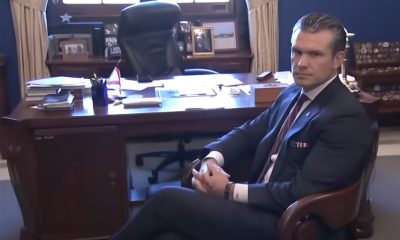Opinions
Media portrayal of Trayon White does him no justice
Washington Post’s unfair coverage ignores record of good deeds
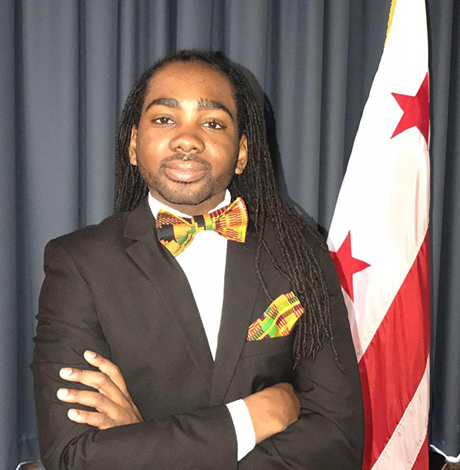
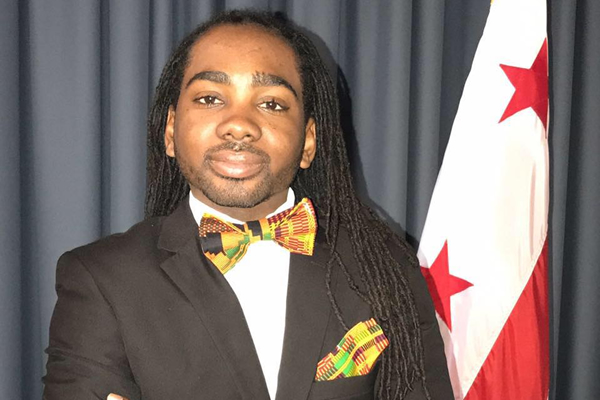
D.C. Council member Trayon White (D-Ward 8) (Photo via Facebook)
Over the past few weeks, there has been immense focus on Ward 8 Council member Trayon White’s comments in a Facebook video that the Rothschilds are manipulating the weather. Once The Washington Post discovered the video, it began running articles with headlines that White said “Jews control the weather,” which he never said. The distinction between saying “Rothschilds” versus saying “Jews” is important because The Post went from merely reporting facts to ascribing intent to White’s statements.
Media outlets worldwide then picked up the story. White did not know that his statement about the Rothschilds could be construed as targeting Jews as a group. To reach that conclusion, he would have needed to know that conspiracies about the Rothschilds are long-running anti-Semitic themes, which he and numerous others, including local Jewish leaders, acknowledge that he did not know.
Upon hearing of the history of Rothschilds conspiracy theories and the impact that they have on the Jewish community, White sincerely apologized, and met with his Jewish Council colleagues and Jewish community leaders, including Rabbi Batya Glazer. The Jewish leaders he met with believed his apology was sincere and expressed a willingness to work with him. White then attended Passover Seder with his Council colleague Elissa Silverman, who is Jewish, and D.C. Attorney General Karl Racine. After that, he attended a guided tour of the Holocaust Museum, set up by the Jewish Community Relations Council.
In response to criticism about White’s tour of the Holocaust Museum, after another Washington Post article, Jews United for Justice, a D.C.-based progressive organization, noted in a statement that, “We have spoken with several people who were present for the museum visit, including a Jewish leader, who say the Post article isn’t an accurate picture. They describe Trayon as sincere in his desire to learn, and that the vast gaps in knowledge and understanding between Black and Jewish communities became evident again and again during the tour.”
These are not the actions of someone who is anti-Semitic and not interested in learning more about Jewish history. White admits in a Facebook Live video that he was “ignorant” about Jewish history and never learned about the Holocaust in school, so disparaging him for asking sincere questions is counter-productive and serves no one. It’s also insensitive and elitist, as many people learn best by asking questions and engaging in dialogue. White should not have been derided by a Washington Post reporter for asking questions in a sincere attempt to learn about a topic that is new to him.
Jews United for Justice’s statement further said that, “Councilmember White closed his Council office to ensure that the entire staff would be present for the museum visit. This in itself shows the depth of his seriousness.” Nonetheless, he was criticized for “leaving early” when he walked away from the group to explore the museum on his own, which he said he did to avoid the uninvited reporter who was following him.
Last week, The Washington Post wrote an article about a $500 donation that White made to the Nation of Islam back in January because local members, who provide much-needed community support in Ward 8, asked him. The donation was made before Louis Farrakhan made anti-Semitic and homophobic comments at a February event that has garnered recent attention. The donation was also made months before the Rothschilds comment was made, so it has no bearing on the sincerity of White’s outreach efforts with the Jewish community. However, the media just became aware of the donation when White filed his April campaign finance report, so a donation that was made months prior to his attempts to make amends with the Jewish community is being used to assert that his efforts are not heartfelt.
Trayon White was born and raised in Ward 8, the District’s poorest ward. Markita Bryant, 31, a youth activist and paralegal, grew up with Trayon in Southeast and went to college with him. The media coverage of White particularly bothers her because “that’s not who Trayon is. If he feels that he hurt or offended someone, he internalizes it, acknowledges it and works on it. He takes in criticism and he will improve himself.”
“He sacrifices a lot to serve the community, including food and sleep,” she said. “He has literally given a neighborhood child the shoes off his feet at a community event when the child’s shoes were stolen.” Bryant further noted, “Trayon’s brilliant because he takes the time to sit there and understand the information in front of them. If he’s not learning, he’s helping others. That’s why he graduated with a 3.7 from the University of Maryland Eastern Shore. He’s the biggest listener and he’s so patient. He works his butt off for the people.”
Star Bennett, 28, is a transgender woman and one of the founders of Check It, a former LGBT gang turned entrepreneurs. When discussing White’s openness to all people, Bennett said, “Trayon was always cool and very respectful. He never had a problem with me being transgender. He’s always smiling every time he sees me.” Bennett mentioned that White was at the grand opening for the Check It Enterprises store in Ward 8. “He always comes and supports us.”
Wendy Glenn, 50, a community engagement specialist and longtime ward 8 resident, said, “Councilmember White has gone out and galvanized a group of marginalized folks. He’s given the youth something to aspire to. They know that he came from meager beginnings and now represents everyone. He is a young man that has grown up in the same way as they have, and he hasn’t let that stop him.”
Glenn, who has known White since he was a teenager, was “impressed with him as a teen and more impressed with him on the Council. I saw his growth,” she said. “I had a group of LGBTQ youth that did modeling at Barry Farm Rec Center and he was very supportive of them.”
Glenn described the recent media coverage of White as a “false depiction. It’s sensational journalism. To know Trayon is to know him in love. He’s a church boy. He has shown no level of hate. He hates injustice in any form.”
(Editor’s note: The author and Trayon White were previously colleagues at the D.C. Office of the Attorney General, Community Outreach.)
Lateefah Williams is an attorney and a former president of the Gertrude Stein Democratic Club, the District’s largest LGBT political organization.
Commentary
On this Transgender Day of Visibility, we can’t allow this administration to erase us
All people deserve to have our experiences included in the story of this country

By KELLAN BAKER | Since 2009, the world has observed Transgender Day of Visibility (TDOV) each March 31. The importance of ‘visibility’ feels especially significant this year, not only as a trans person but for me as a researcher whose career has been centered on equity and inclusion for transgender people. My work over the past 16 years, which has focused on advancing fairness, access, and transparency in health care for gender diverse populations, could not have prepared me for the speed and cruelty at which the Trump administration has worked to literally erase transgender people from public life.
From banning transgender people from serving openly in the military, blocking access to best practice medical care, and making it all but impossible for us to obtain accurate identification documents that match our gender, the impact of these attacks will be felt for years to come. As a scientist dedicated to fostering the health and wellbeing of diverse communities, I am particularly devastated by the intentional destruction of the federal research infrastructure and statistical systems that are intended to ensure the accurate and comprehensive collection of data on the full diversity of the U.S. population.
The importance of data cannot be understated. This makes the efforts by the federal government to remove survey questions, erase variables from key data sets, and stifle research even more alarming. By simultaneously removing access to existing datasets, removing gender (and other key measures, such as sexual orientation, race, and disability) from key surveys, terminating federal funding for research projects that include trans people, and censoring research projects at federal data centers, this administration’s goal is to erase the lived experiences of trans people – with the idea that if we don’t exist in data and in research, the federal government can claim that we don’t exist at all.
Just in the past two months, we’ve seen a rapid decimation of the inclusion of transgender people in federal research and their visibility in the federal statistical system.
Data sets that included gender measures have disappeared from federal websites. Critical data sets used by federal and state policymakers, public health staff, and researchers, such as the Youth Risk Behavior Surveillance System (YRBSS), were removed from the CDC website in response to a Trump executive order that made it the policy of the administration to recognize only two sexes, male and female. Although some datasets have been put back up, gender variables have been removed.
Surveys that had asked about gender identity no longer do. Claiming that the removal of gender identity measures from key national surveys such as the American Housing Survey, Household Pulse Survey, and National Health Interview Survey were “non-substantial,” the Trump administration has essentially skipped the extensive notice and public comment process that is required to make these types of changes—the same process that were used to add gender identity (and sexual orientation) measures.
In addition, attempts to exclude trans people and other communities facing disparities from surveys will result in a lack of large enough sample sizes to conduct quality data analysis, while reducing any chance of analyzing racial and ethnic differences among trans people.
Hundreds of grants supporting inclusive research have been terminated. The unprecedented move of the National Institutes of Health (NIH) to terminate research grants that include transgender people is just one example of this administration’s rush to eliminate funding from active scientific projects. In many cases, similar agencies are also now required to remove gender identity measures from federally supported surveys. Prominent trans health researchers have watched as their research portfolios are halted, work stopped, staff laid off, and participants left without care.
At the Institute for Health Research & Policy at Whitman-Walker, for example, we have already had seven studies terminated, with a financial impact that exceeds $3 million. One of these cancelled grants was a multi-year, longitudinal study in partnership with the George Washington University to explore the impact of structural racism and anti-LGBTQ bias on HIV risk among young queer and trans people of color nationwide. The notices of termination for this and other awards clearly spell out the administration’s disdain for groundbreaking research that seeks to understand and address health disparities related to LGBTQ populations, particularly trans people.
Censoring research. As seen with recent changes implemented by the CDC, the censorship of gender-related terms on federal websites and scientific publications is intended to further the erasure of evidence detailing the disparities faced by LGBTQ people.
On a day dedicated to honoring the lives and contributions of trans people, the impact that these egregious actions will ultimately have on the health and wellbeing of trans and nonbinary people is chilling. Without access to this knowledge, researchers will not be able to examine the repercussions of the harmful policies put forth by this administration and many states across the country, including bans and restrictions that negatively impact trans people’s physical and mental health, economic security, and educational outcomes.
Although there has been an effort by non-government entities to collect and store previously collected data prior to the Trump administration’s purges, state surveys, private research firms, and academics cannot fill the void left by the federal government’s decision to halt data inclusion. Ensuring that public entities and researchers can continue to use these datasets is only one piece of the puzzle being taken on by groups such as the Data Rescue Project and repositories like Data Lumos. Work also continues thanks to the efforts of the U.S. Trans Survey, the California Health Interview Survey (CHIS), and the important research and analysis of both Gallup and The Pew Research Center. Yet, gaps still exist due to threats of federal funding cuts to organizations committed to safeguarding inclusive data assets in the wake of the administration’s continued assault on trans rights.
This administration suggests that removing one of the only tools available for identifying an entire population of people is a “non-substantial” action. This not only questions the intelligence of the American people but is a direct insult to trans folks everywhere. All people deserve to be counted and to have our experiences included in the story of this country. Transgender people have always been a part of this country, and even if our nation’s surveys choose to exclude us, we continue to exist—authentically, unapologetically, and forever visible.
Kellan Baker, Ph.D., M.P.H, M.A., is executive director of the Institute for Health Research & Policy at Whitman-Walker.
Opinions
LGBTQ autistic people must reclaim narrative about their lives
April is Autistic Acceptance Month

It has been 10 years since I started to work on a project that later became “Autistic Initiative for Civil Rights,” the first autistic self-advocacy group in Russia and Ukraine, created by autistic people for autistic people. In a region where most “psychiatrists” couldn’t distinguish autism from schizophrenia, and autistic people were considered to be a “childhood diagnosis” by many “experts,” the idea seemed weird. Especially because I was promoting a neurodiversity paradigm: An idea that the diversity of human brains is normal. The problem of autistic people is not in autism itself, but in discrimination and stereotypes, and being autistic is an even bigger part of me than being trans. Autistic people need support, not a cure.
No wonder that our first allies were LGBTQ organizations, because LGBTQ people knew better than others what it meant when people considered you to be ill and damaged because of their biases.
But there is another reason why the autistic and LGBTQ communities have always been close. There is a connection between being autistic and being LGBTQ.
“People who do not identify with the sex they were assigned at birth are three to six times as likely to be autistic,” as the largest study committed on this topic showed. Most of the studies show that the rate of LGB people among the autistic community is two to three times higher.
I started to write about it in Russian, creating special websites and social media projects about LGBTQ autistic people, because Russian is the most common language in post-USSR. I hate Russian politics, but I wanted a wider audience.
I translated a lot of great personal stories written by LGBTQ autistic people from English into Russian, and most of the stories I translated were from the U.S..
For years, autistic communities in different countries used the American autistic community as an example and sometimes even as a role model because so many great disability rights activists and autistic activists came from the U.S.
For example, as a young teenager who’d just found out that they were autistic, I was deeply inspired by the news that autistic activist Ari Ne’eman became the first openly autistic presidential nominee in American history after President Barack Obama in 2009 appointed Ari to the National Council on Disability. I read it in times when, in Russian and Ukrainian, almost all information was written in a way that was telling me that I don’t have a future. And even this information was mostly translations of some old American big charities’ texts. It was American, not Ukrainian or Russian activists who questioned those biases.
For autistic people like me, the American autistic activists, including American LGBTQ activists, were the anchor.
And now, when the autistic community in the U.S. is under attack from the MAGA government, it may have a global impact, harming not just autistic people in the U.S. but autistic people worldwide, and LGBTQ autistic people will suffer the most.
Robert F. Kennedy, the new secretary of the U.S. Department of Health and Human Services, promoting the idea that autism is caused by vaccines. In Russia, it is a very common stereotype, and many general practitioners believe in it. I used to speak about WHO norms and American and European studies to fight it, and I am sure that many activists in countries with poorer medicine and higher risks of disease that can be prevented by vaccination did the same. But now, when the leading health organization in an extremely influential country is saying that vaccines cause autism, it made people stop vaccinating their kids globally, which will increase the possibility of a new epidemic.
But there is another problem, an even bigger one, from a moral perspective. Kennedy is erasing years of autistic fights to stop making autism look like a health crisis.
Moreover, on Feb. 13, President Donald Trump issued an executive order stating that the administration would be creating a commission to attempt to lower the population of autism. People like me are called to be part of an “epidemic.”
In reality, there is no “epidemic” of autism; it is just more specialists who are able to diagnose autism and more people who are ready to search for a diagnosis for them and their children, and autistic people are not a problem for “our [American] economy and our security.”
I spoke with Sam Crane, an autistic disability policy expert and a former legal and policy director of the Autistic Self-Advocacy Network, the organization I used as an example when I was creating my own autistic initiative group:
“Calling autistic people a threat to our country and reopening the discussion about autism and vaccines does nothing to help us,” Crane said. “We need access to healthcare, community-based supports, education, and civil rights — all of which are under threat under this administration. We also need to support research on actual quality-of-life issues, including research by autistic researchers ourselves — both of which this administration has defunded. This especially hurts autistic people who face other kinds of discrimination, such as autistic people of color and autistic LGBTQ people. People who have filed discrimination complaints about multiple kinds of discrimination have had their investigations halted — forcing them to drop their complaints about race or gender discrimination in order to keep their disability discrimination claims active. People may soon be forced to decide between getting gender-affirming healthcare and getting community-based services for their disability-related needs. We deserve real support, but instead this administration is treating us like a problem to be solved.”
Indeed, the Trump administration treated both autistic and LGBTQ people — especially trans people — as a problem to be solved.
LGBTQ autistic people will suffer one of the first, partly because they have fewer chances to fight LGBTQ-phobia and systemic discrimination. And there is also a risk that LGBTQ groups may not understand why they should fight for their autistic siblings.
It will have a broader impact because of the visibility of American activist communities — both autistic and LGBTQ communities. Stereotypes about autistic LGBTQ people will travel across borders just like autistic self-advocacy spread across the world.
Also, there were USAID programs that helped disabled people and LGBTQ people abroad, and this help now will be stopped.
MAGA is not just harming autistic LGBTQ people in the USA, it’s harming them globally.
It is April; Autism Awareness Month, promoted by a big charity that was globally demonizing autism, but autistic activists reclaimed April, making it Autistic Acceptance Month.
Now autistic activists, especially autistic LGBTQ activists, need to reclaim the narrative about their lives once again, and the LGBTQ community needs to help them in doing this. This is a fight against the system. Autistic LGBTQ people will always be a part of both the autistic and the LGBTQ community. The question is, would a LGBTQ community help us in this critical moment of our history?
Commentary
Children of American service members defend Pentagon DEI policies
Students protested Defense Secretary Pete Hegseth during Germany visit

“And a little child shall lead them.” (Isaiah 11:6)
Since the new U.S. Defense Secretary Pete Hegseth began his assault on diversity, equality, and inclusion in the U.S. armed forces, hundreds of students at U.S. military schools in Europe and Japan — the children of American servicemembers stationed overseas — have staged walkouts and other demonstrations to protest the new policies.
When Hegseth visited Stuttgart, Germany — the headquarters of U.S. European Command and U.S. Africa Command — on Feb. 11, more than 50 students from the Alexander Patch Middle School held the first of these protests when they left their classes and gathered in the school’s courtyard for an hour-long protest meeting.
More than a hundred students at the Nile Kinnick High School in Yokosuka, the children of Navy parents and Defense Department employees based at Yokosuka, Japan, the headquarters of the U.S. 7th Fleet, walked out of classes and held a protest in the school’s courtyard on Feb. 21, chanting and carrying banners.
“I love this school; I think one of its strengths is its diversity,” said Kinnick High School senior Chase Hassell, president of the student council and leader of the walkout. “I think we have such a great multicultural community, and I think that it’s important for the development of all children — not just us — to have experience with different people of different beliefs and backgrounds,” Hassell told Stars and Stripes after the demonstration.
And on March 6, hundreds of students participated in demonstrations at Humphrey High School at Camp Humphreys, South Korea, and at Ramstein High School and Kaiserslautern High School in Ramstein, Germany, and Wiesbaden High Schools in Wiesbaden, Germany, carrying signs that proclaimed “Solidary in Diversity,” “Censorship is Un-American,” “Our Classrooms Are Not Your Ideological Battleground,” “This Affects People of Color, LGBTQ+, Woman, and Everyone,” and “More Books, Less Bigots!”
There’s a great deal of anger around the country about what the Trump administration is saying and doing. But anger is not enough. These students are not just angry, they’re actually doing something to fight back. Maybe we all have something to learn from them.
Daniel Volman is the director of the African Security Research Project in Washington, D.C., and a specialist on U.S. national security policy toward Africa and African security issues.
-
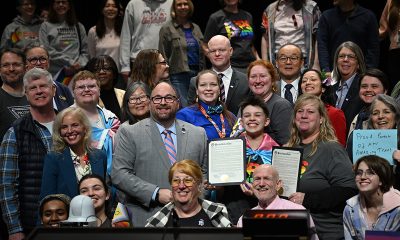
 Virginia5 days ago
Virginia5 days agoFairfax County School Board issues Trans Day of Visibility proclamation
-

 Trinidad and Tobago5 days ago
Trinidad and Tobago5 days agoTrinidad and Tobago recriminalizes homosexuality
-
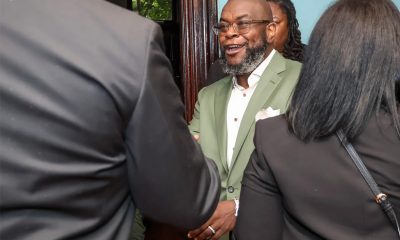
 National2 days ago
National2 days agoDestination Tomorrow works to empower LGBTQ community
-

 Maryland2 days ago
Maryland2 days agoAt transgender visibility celebration, Moore called out for lack of action

